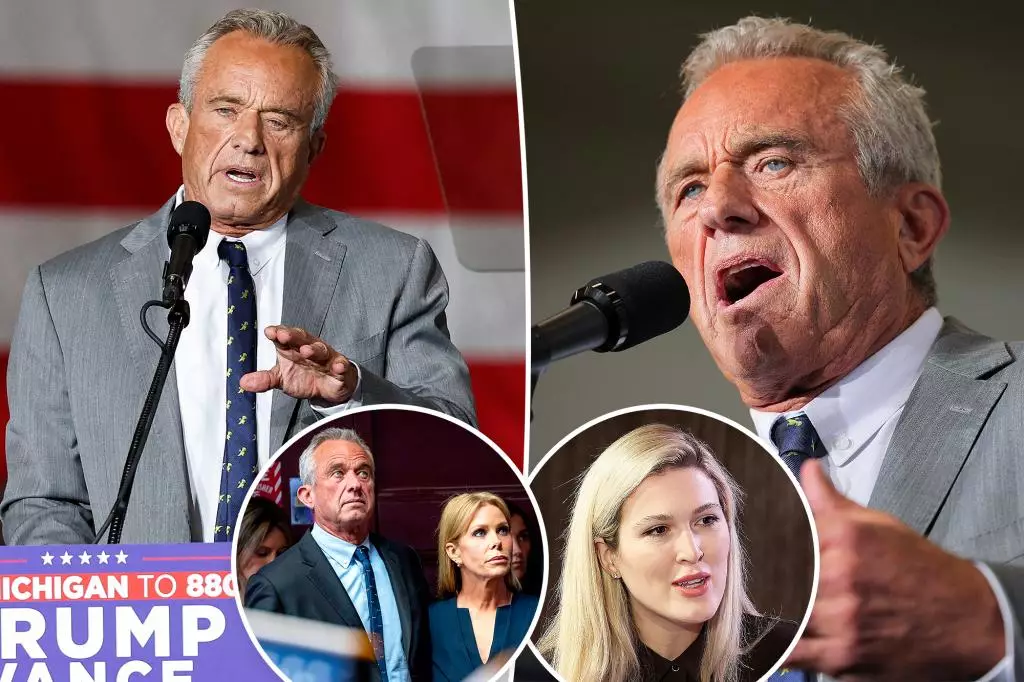In an age where public figures are scrutinized under the harsh gaze of media and public opinion, Robert F. Kennedy Jr. has found himself in the eye of a storm. Amid his recent scandal involving reported sexting exchanges with New York Magazine writer Olivia Nuzzi, Kennedy’s public appearances suggest a complex interplay of personal strife and professional advocacy. Recently, he attended a vital Senate roundtable on nutrition, showcasing his ongoing commitment to health issues even as his personal life becomes a matter of public interest.
At the Senate discussion titled “American Health and Nutrition: A Second Opinion,” hosted by Wisconsin Senator Ron Johnson, Kennedy seemed unfazed by his turbulent personal life. Accompanied by high-profile figures in health and wellness such as Jillian Michaels and Dr. Jordan B. Peterson, Kennedy took the stage, embodying professionalism. Eyewitnesses reported that he “seemed great” during the event, emphasizing that his focus remained on the critical issues at hand rather than his ongoing scandal. This presentation raises questions about the resilience and priorities of public figures grappling with dual pressures—personal and professional.
The balancing act of maintaining one’s public persona while navigating personal controversies is a challenge many public figures face, and Kennedy appears to be managing this dynamic with a degree of competence. His ability to keep his personal life separate from his advocacy, at least publicly, reflects a certain level of calculated control over his image.
More significantly, Kennedy’s participation in the Senate roundtable illuminated his longstanding crusade against what he perceives as corporate influences on public health. Along with other panelists, he addressed critical topics such as the rise of ultra-processed foods and the regulatory failures concerning food safety. This discussion resonated with his earlier statements about obesity and the health of the American public. Kennedy’s comments harkened back to a time when obesity was nearly unheard of, painting a picture of a society grappling with health issues exacerbated by corporate interests.
Kennedy’s fierce criticism of government bodies like the USDA and FDA, claiming they have been compromised by the very industries they are meant to regulate, aligns with a growing narrative among health advocates. They argue for a more transparent and accountable food system, challenging the status quo and seeking a healthier future for Americans. Such stances mark him as a polarizing figure—both attracting supporters who resonate with his health advocacy and detractors who criticize him for his controversial approaches.
Despite the overarching focus on health reform, Kennedy could not entirely escape questions regarding his sexting scandal. When pressed by Fox News host Martha MacCallum about any regrets over the scandal, Kennedy opted for silence, emphasizing his reluctance to engage in personal matters publicly. This tactic of deflecting from personal inquiries to focus on broader issues illustrates his strategic communication style. By steering conversations toward health and governance, he attempts to reclaim the narrative and spotlight issues that matter to him and his supporters.
Kennedy’s reticence in admitting personal faults or discussing his scandal conveys an image of a seasoned politician aware of the implications of his public image. The juxtaposition of his scandal against his health advocacy creates a captivating narrative that underscores the complexities individuals in the public eye must navigate.
As the political landscape evolves, Kennedy’s role may shift depending on upcoming elections and the potential of influencing health policy. His recent endorsement of Donald Trump, emphasizing a vision for a healthier America, signals his ambition to maintain a prominent position in political discourse. Given the stakes involved, including possible cabinet positions should Trump return to office, Kennedy must balance his advocacy with personal reputation.
Ultimately, Robert F. Kennedy Jr. represents the continuous tug-of-war between personal integrity and professional ambition. His situation serves as a microcosm of the challenges faced by those in public office, particularly in an era marked by instant information availability and incessant public commentary. Whether managing personal crises or steering vital health discussions, Kennedy’s journey will likely prompt ongoing debate regarding the intersection of personal and public life in the political arena.


Leave a Reply